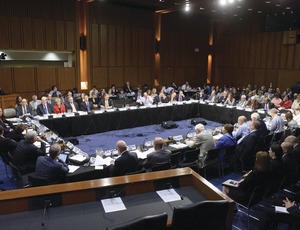
House and Senate lawmakers have come to the negotiating table to begin talks aimed at producing a new surface-transportation law. Construction and state transportation officials, who have put up with nine short-term highway-transit measures since 2009, would love a quick deal. But negotiations are likely to go on for weeks.
The conference committee's May 8 initial meeting featured lawmakers' opening statements and, as expected, resolved virtually nothing. The real discussions between House and Senate aides and legislators have begun behind the scenes.
Justin Harclerode, a House Transportation and Infrastructure Committee spokesman, says, "I would expect work on the issues will only intensify now as we work toward a final agreement that includes significant transportation program reform." As far as the construction industry is concerned, the more intense and productive the negotiations, the better.
The Senate's starting point is the two-year, $109-billion bill that it passed in March. The House brought to the table the three-month bill it cleared on April 18, which also includes language to speed approval of the Keystone XL oil pipeline. The Senate version is silent on the pipeline. Both bills also would accelerate project approvals, with the House version more pro-industry on that score.
Industry lobbyists advise watching how negotiations go on the bill's revenue title. The House version adds no revenue to projected Highway Trust Fund income; the Senate boosts the trust fund by $9.2 billion over two years and $13.9 billion over 10 years. Jay Hansen, National Asphalt Pavement Association executive vice president, says a key question is, "Are the revenues that are being put on the table … going to be able to pass the Tea Party members of the House side?"
Industry officials want as long-term a bill as possible. The conference chair, Senate Environment and Public Works Committee Chairman Barbara Boxer (D-Calif.), says the final version could stretch beyond the Senate measure's Sept. 30, 2013, end point, if lawmakers can find additional funds. She adds, "I'm very optimistic on the funding side."
Can the two sides reach an agreement by June 30, when the current stopgap authorization lapses? David Bauer, the American Road & Transportation Builders Association's senior vice president for government relations, says, "After 31 months of extensions, I don't think anybody has a functioning crystal ball here. But there are some pretty serious tailwinds behind this." Bauer adds, "It's not going to be easy but … somebody would have to decide that we're not going to do this to take it down right now."
Partisan differences did flare during conferees' first meeting, but the string of speeches was generally cordial. Boxer also notes, "No one has laid down a line in the sand." That's an encouraging sign, but the negotiations are just beginning.


Post a comment to this article
Report Abusive Comment